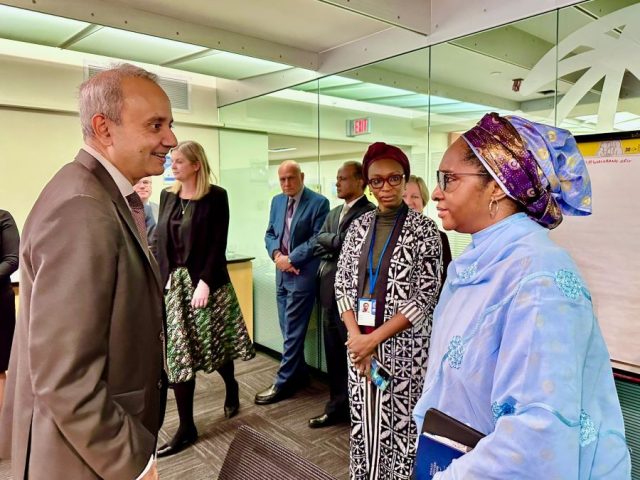
MON. 10 APRIL 2023-theGBJournal | Nigeria’s Minister of Finance, Budget and National Planning, Mrs. Zainab Shamsuna Ahmed has arrived in Washington DC for the 2023 IMF/World Bank Spring Meetings.
The Minister is accompanied by a high level Nigerian delegation for the meeting which kicks-off today.
Shamsuna Ahmed on arrival attended a high-level working group meeting on Global Financial Architecture with African Ministers of Finance, Planning and Economic Development.
The open discussion was held on ‘’an IMF for 21st century-Lending, Governance and Future Direction.
Meanwhile, the World Bank President, David Malpass kicked off the Spring Meeting with a discussion on the complex challenges facing the global economy, and in his opening remarks delved through the global challenges, the global sovereign debt roundtable, Ukraine, and the World Bank Group’s evolution process.
‘’Global growth is expected to be weak this year, slowing to 2% from 3.1% in 2022. For the U.S., we’re expecting a slowdown to 1.2% from 2.1% in 2022,’’ Malpass reminded the delegates in his opening remarks.
‘’Several factors are weighing on the second half outlook: Oil prices have jumped back above $80/barrel. The recent banking sector stress dampens activity. And inflation pressures persist. The U.S. month-over-month core inflation has been rising over the last five months. There will be new data on Wednesday.”
If we look at developing countries excluding China, we expect a slowdown to about 3.1% in 2023 from 4.1% in 2022. The concern in our recent reports is that slow growth will persist for years for many developing countries, increasing the fiscal stress and debt problems. It’s a combination of weak investment, higher interest rates, and relatively weak growth in the advanced economies.
The danger is acute due to inflation, currency depreciation, rising debt service costs, and the collapse of international reserves. The diversion of natural gas to Europe presents grave obstacles to developing country production of electricity, fertilizer, and food. These problems are severely constraining future growth and deepening inequality and fragility for developing countries. I travelled to West Africa in March, where we are working to provide support in the face of these problems.
Looking to the big picture, I’ll mention two problems: first, the normalization of interest rates after an artificial decade near zero. This creates problems in terms of the duration mismatch as we’ve seen in the bank failures, liquidity shortages, and how to allocate the losses. The duration mismatch will take time to digest. With inflation persistent and the dollar weakening, the risk is that the losses will be allocated to those with lower incomes, including through inflation.
A second major problem is that the available global capital is being absorbed by a narrow group of advanced economies that have extremely high government debt levels. I’ll call them “sinkholes.” To make matters worse, their populations are aging rapidly and the peace dividend of the 1990s was used up.
I’ve advocated a range of new policies that would spur production to combat inflation and currency weakness, but the likelihood is a long period of slow growth, asset repricing, and capital moving in the wrong direction – toward a narrow group of governments and big corporations rather than to the small businesses and working capital that could add to global growth.
I’ll note two exceptions to the slowdown: China and India. China’s GDP growth is rebounding to over 5% in 2023, with strong private investment. I note the stability of China’s currency and the countercyclical nature of its monetary policy. I was in China in December as they ended the lockdown. The government is encouraging growth in services, especially health care and tourism.
India continues to be one of the fastest-growing major economies in the world. We’re looking for growth of 6.3% in their FY23/24. They will feel some effect from the global slowdown. I was there in February and think it will take capital market liberalization for India to achieve their 8% growth goal.’’
Twitter-@theGBJournal|Facebook-the Government and Business Journal|email:gbj@govbusinessjournal.ng| govandbusinessj@gmail.com









